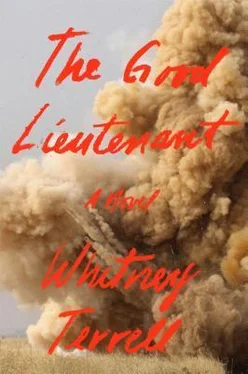DANGER

STAY BACK

After about ten yards, he saw that the convoy had turned in at his front gate, and he retreated quickly back to the copse. What he wanted to do was warn them: Yes, the body is here. I don’t want it. But watch out — there might be something dangerous in the field. Against this was his awareness of how difficult, and possibly incriminating, this would be to explain, not to mention his fear of prison and arrest, the simple, unreasoning desire to remain free. After an hour, these contradictory impulses brought him to the canal on the west side of his house, at a point that, by dead reckoning, he figured was roughly perpendicular to the dry well that contained the body. He was crossing on a felled palm trunk when he felt a faint spray of wetness against his skin and he saw the yellow head of the dog swimming below, head up, very earnestly, then disappearing into the field without a look back. He bleated to it quietly. Nothing. He pounded the ground and hissed, and it came to him, tail wagging, ass down on the ground — excited. Probably barking. He saw its throat work. Urging him to come out into the field. There are strangers here! No, no, no. Quiet. Quiet, please. Then, glancing up, he saw trucks coming out the back gate. And then he was on his feet, scrambling, pushing out into the open, giving his broadest, most moronically chipper grin, the one used by American actors whose role was to be humiliated or, most preferably, ignored: Yes, hello, soldiers? I am not against you! Yes! Please stop! Please wait! There’s danger this way!
Subject: re: mobile camera network
Sir,
Request deployment of so-called mobile camera network, if such network should be operational. Destination would be Patrol Base Fortitude, intersection of Route Tender and Route Trap. Request that accompanying technician be familiar with the system.
V/R,
LT Emma Fowler
Echo Company
1st Division
27th Infantry
From: Clarence.McKutcheon@us.army.mil
Subject re: mobile camera network
Lieutenant,
Regret to inform you that cameras are still in the prototype phase. I appreciate your interest in our program and will be happy to comply with your request after a requisite testing period. The estimation from our project manager is one month to six weeks.
V/R,
Major Clarence McKutcheon
HQ Company
1st Division
27th Infantry
Pulowski lay in the meat pod of his trailer, surrounded by forty thousand other meat pods, across the acres and acres of Camp Tolerance, all piped in and nourished by the black goo of the American Forces Network and super-strong AC. Eighteen hours had passed since Fowler had left for the patrol base. Since then he’d showered, hauled his filthy uniform to the laundry, sucked up some meat pod television ( Doctor Who , over on the Sci-Fi Channel of AFN), but avoided email studiously. So it hadn’t been until midnight that he’d seen Fowler’s message, or McKutcheon’s response. Schlubby, white, with the sloped body of a swimming buoy, and a small fortune in hair plugs beading his forehead, McKutcheon had grown up in Sacramento, majored in communications at Chico State, and done ROTC to pay the tab — this back in the middle nineties, post-Gulf, when the last place anybody imagined going was Iraq. As a Headquarters Company officer, he prepared intel reports for the battalion briefings. He wrote PowerPoints, edited the battalion newsletter, supervised Pulowski’s installation of the battalion’s VoIP phone network, but most important, he had been Pulowski’s guide, his Laurence Fishburne, offering, in the smothered language of the true bureaucrat, two pills — fight, or stay inside in the meat pod farm indefinitely. McKutcheon had also made it clear which choice led to enlightenment, which was how Pulowski’s work on the mobile camera system had come up. It was funded under something called the Asymmetric Warfare Initiative. DoD oversight, private matching funds, forty-page progress reports: the true matrix. McKutcheon would get credit from the colonel for bringing in outside dollars. Pulowski would make his own hours, would no longer have to hang around headquarters, would be out of McKutcheon’s hair — and, implicitly, would not be at risk of doing something that might actually get him hurt. So he felt embarrassed to be formulating an argument that the cameras should actually be deployed, as if he were disappointing McKutcheon in some crucial way. But the argument was there, so after he’d lain awake awhile longer, he swung his feet onto the plywood floor of his trailer and turned on the light.
The trailer was spotless, floor swept, programming manuals in alphabetical order atop his desk. His laundry wouldn’t be back until the following morning, so he dug around under his rack for a T-shirt, grabbed his cell phone, and then went outside.
On the surface, Camp Tolerance — the Dining Facility, the laundry, the long stretch of dirt road that he and everybody else in the battalion walked every day, even the gravel corridor outside his trailer — looked the same as it always had. The rocks glowed faintly in the moonlight. The shadowed ranks of the trailers stretched out as far as he could see to either side, fronted by HESCO barriers and grainy due to the lack of light.
However, the panic caused by Sergeant Beale’s abduction still twanged the air, an invisible vacuum, like the hallways of his old house in Clarksville, Tennessee, after his parents had had a fight. His immediate neighbor, Lieutenant Krauss, was a platoon leader with Alpha Company. Normally Krauss liked to leave his door open when he slept, but his door was closed, his trailer dark, which meant he was probably on patrol tonight. Also, Pulowski could hear shouting from the north, directly opposite the door to his trailer and the grated metal steps where he’d sat down to think. As he listened, the voices intensified, then a clear fragment— Well, get him the fuck in here! — broke through, and a pale band of headlights flashed along the frontage road outside battalion headquarters. At this time of night, there would be activity there only if a patrol was bringing Iraqis in for questioning. It was cool out, so he tugged the T-shirt on — noting briefly that it didn’t seem to fit — keyed McKutcheon’s number into his cell phone, and flopped along in his shower sandals to the right. The major would definitely be awake.
“I was thinking about that request from the patrol base,” he said when the major answered. “It sort of makes sense, doesn’t it? I mean, if the cameras were good enough to deploy yesterday, why not send them out now?”
“Yeah, well, yesterday Fowler hadn’t fucked up and lost a guy,” McKutcheon said, more drolly than Pulowski would’ve liked, “ while she was supposed to be installing those cameras. Speaking of which, you got any information on how that went down?”
Pulowski considered this. He hadn’t spoken to McKutcheon since returning from the Muthanna intersection where the attack had taken place. So there was no reason the major would know that he’d had a front-row seat for Beale’s abduction. “No,” he said.
“You didn’t see anything?”
“We got hit. There was a shooter in one of the buildings beside the intersection. The word I got was that Beale got picked off going in.” He was walking fairly briskly between the white ranks of trailers that housed the battalion — taking care to avoid Fowler’s and, especially, Beale’s. As he’d expected, he felt less guilty now that he’d allowed McKutcheon to make the case for doing nothing, rather than making it himself.
Читать дальше














